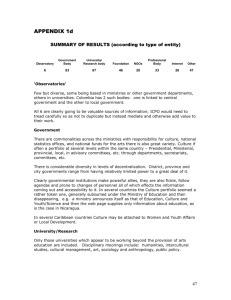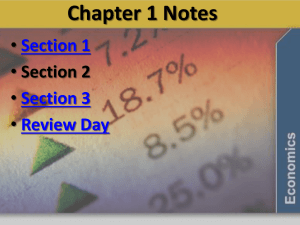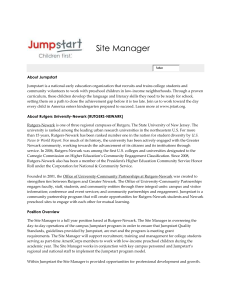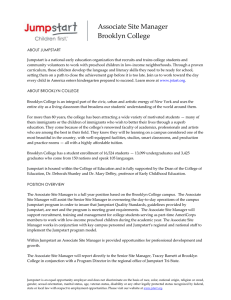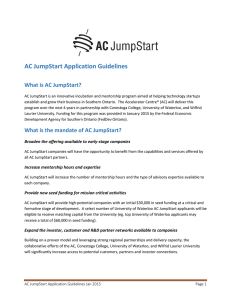Joe CIFAL Employment workshop
advertisement
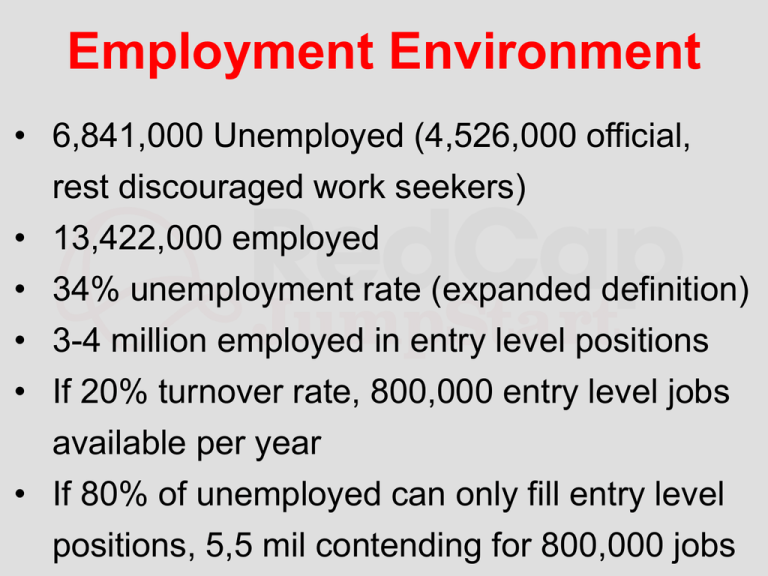
Employment Environment • 6,841,000 Unemployed (4,526,000 official, rest discouraged work seekers) • 13,422,000 employed • 34% unemployment rate (expanded definition) • 3-4 million employed in entry level positions • If 20% turnover rate, 800,000 entry level jobs available per year • If 80% of unemployed can only fill entry level positions, 5,5 mil contending for 800,000 jobs Two Primary Solutions • Reduce wages • Difficult sell to unions, employees and unemployed • Increase productivity, including • Innovation • Less red tape • More enabling business environment • MORE PRODUCTIVE WORKFORCE Need for Mindset Change • Unemployed – more initiatiave, productive mindset • Employees – Upward mobility • Business managers/owners – capacity/skills development of workforce, willing to release good people • Government – Change from welfare to development priorities Jumpstart Jobs Fund Expansion Project Jumpstart History • Redcap started Jumpstart in 2007 • Work experience for unemployed who have gone through life skills training • Started partnering with various NGOs in 2009 in KZN • Expanded this nationally in 2010 • Jobs Fund project 2012 Motivation for Jobs Fund Project • Funding for NGOs to scale up work • Help NGOs to add key components required for entry in Mr Price (e.g maths, literacy, customer service) • Better coordination of project with help of systems like Joblinx • Better collaboration of stakeholders (e.g. network, curriculum development) Partner Criteria 1. Already running soft skills programmes (with possible exceptions) 2. Operating in areas where there is demand for labour with Mr. Price 3. Have capacity to expand 4. Have appropriate organisational systems in place (reporting, financial, HR, etc.) 5. Willing to comply with minimum requirements for training (see upcoming slide) Mr Price Candidate Criteria 1. Matric certificate 2. 30 years old or younger 3. No criminal record 4. No bad credit history 5. Ability to pass Mr. Price tests (math literacy, bar code recognition and customer service assessment test) Jumpstart Training Criteria Core Purpose • Attitude/Behaviour/Character Development and Basic Skills Course/Topic Hours • Course Minimum Hours: 40 • Topic Minimum Hours: 1 (unless otherwise specified) Required Life Skills Topics (1) (with required hours if different from standard of 1 hour) • • Career guidance (2) Communication/Presentation Skills (3) • • Conflict resolution Customer Service (2) • • Finances Goal setting/Planning • • Healing of the Past (2) Sexual health/Romantic relationships/HIV/AIDS (3) • • Job preparation skills (2) Physical health (healthy living) • • Rights and responsibilities (e.g. Basic conditions of employment) Time management • Vision/Purpose Required Life Skills Topics (2) The following topics may be covered within the above topics or separately and thus don’t have 1 hour minimum requirements: • • • • • • • Life-long learning Motivation/Self-esteem Personal Development/Character Work ethics Emotional maturity Problem solving/Decision making Substance abuse Business Calculations/Literacy • Students need to be equipped to pass Mr. Price Test • No training requirements will be set, as it is up to the organisations how much they want to screen people. Two options are below: 1. These skills can be taught by organization and/or 2. Students can be prescreened based on ability to pass Distribution Strategy • Payment only after people have been successfully placed into employment with Mr Price. • Training done for first placements will be “frontloaded” by NGOs, meaning that first disbursement will be done on people trained through other funding. • Funding not intended to replace existing funding, but rather to scale up training capacity (with possible exceptions) • • • Joblinx Online system developed for linking employers with candidates of training providers System has been functional since the beginning of last year New developments are being done to enable it to have additional functionality for Jumpstart specific needs • Automated linkage between base stores, head office and NGOs • More fields specific to Jumpstart • Better searching and reporting processes Employer Partnerships • Spar – Estimated 5000-1000 vacancies annually • Smollan – 4000 vacancies annually • Mr Price Supply Chain NGO Partnerships • Harambee – 10,000 placements, 3 years • Project Literacy – Tapping NSF • Dell Foundation: 100 computers, 5 NGOs Current Project Status • Communication sent to 80+ organisations • 35 Interviews completed • 30 organisations likely to participate in 2012 • Gauteng, W Cape, KZN - initial focus • E Cape, Free State – next priority • Other provinces to follow MISSION To change and develop the minds, hearts and spirits of people for life success. World Changers Academy (WCA) offers two main types of programmes: Life Skills – Focusing on “changing the world within” Leadership Skills – Focusing on “changing the world around us” Note: Both courses have element of each form of “change”, but life skills focuses on internal change, while the leadership course focuses on change externally. TARGET GROUPS •Young Adults/Unemployed •Life Skills - 4 Week courses run in local communities from 9-1pm daily •Leadership Courses- 11 Weeks, (5 weeks residential, 6 weeks outreach, often assisting with life skills) •High School Students •Life Skills – 1 hour session per week for school year (about 30 sessions) •Leadership – 7 days (residential) •Workers •Life Skills - 12 Week course for employees, run 1-2 hours per week at the place of work, with a 2 day residential programme at beginning an end of the course •Leadership Courses - 2 day, 5 day, 7 day (flexible) (residential) In the Future… •Organisational Leaders •Tertiary Students •Prisoners TWO MAIN APPROACHES TO IMPACTING OUR STUDENTS: Education – Giving people skills and knowledge on various topics. (People who have certain skills and knowledge pass these on to students, who generally don’t have them.) Impartation – Passing on one’s passion, values, heart and attitudes to others. (This goes beyond just learning a skill or gaining knowledge, but involves “catching” the heart of what the facilitator / speaker shares) WCA’s Model EXIT STRATEGY FOLLOW-UP PROGRAM (Volunteer, study, employment, job creation opportunities) 4 wee ks LIFE SKILLS STUDENTS 100% (e.g. 300 from 10 courses) Courses run in local communities where people live LEADERSHIP STUDENTS 10% (e.g. 30 from 300) Courses run at WCA’s residential leadership centre Course includes practical (outreach) back in home communities where students live (mostly involves assisting running further life skills courses). VOLUNTEER STAFF 1-2 year s 1% (e.g. 3 from 300) MANAGEMENT 0.3% (1) X Year s 11 wee ks The lower the layer, the higher the preference given in follow-up opportunities (mostly due to ability to give better references as there is a stronger relationship built) Thank You






